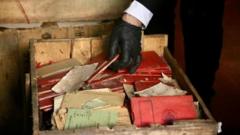Crates containing documents associated with the Nazi regime were unexpectedly uncovered in the basement of Argentina's Supreme Court while preparations were underway to relocate the building's archives to a new museum. These documents, sent by the German embassy in Tokyo, arrived in Argentina on June 20, 1941, via 83 diplomatic pouches on a Japanese steamship. They were seized by Argentine customs officials later that year after several pouches were randomly opened and revealed Nazi propaganda material.
The unusual find was made last week by workers who, while organizing archival items, discovered wooden champagne crates that piqued their interest. Upon inspection, they found materials aimed at promoting and consolidating Adolf Hitler's ideologies within Argentina during World War II, as noted by the Supreme Court. The crates were swiftly relocated to a secured office, with court officials reaching out to the Buenos Aires Holocaust Museum for assistance in cataloging the contents.
Experts examining the documents have uncovered black-and-white photographs and membership booklets emblazoned with swastikas. Historians are keen on studying these documents further to uncover insights into Nazi financial networks and their global connections.
Argentina's Supreme Court has communicated the details of the documents' arrival; initially classified as "personal effects" by the German embassy in Buenos Aires, suspicions grew regarding the shipment's size, prompting Argentine customs to notify the foreign minister. The subsequent opening of five pouches unveiled postcards and various Nazi propaganda items.
Despite a request by the German embassy to return the pouches to Tokyo, an Argentine judge ordered in September 1941 that all 83 be confiscated for further examination. However, no final decision on their fate was reached until 1944, when Argentina severed ties with Axis powers, resulting in the documents being forgotten in the court's basement for several decades.
Following World War II, Argentina, under President Juan Perón, became a sanctuary for numerous high-ranking Nazis, including figures like Adolf Eichmann and Josef Mengele. In a formal acknowledgment of the past, President Fernando de la Rúa offered an apology in 2000 for the country's role in sheltering Nazi war criminals.


















